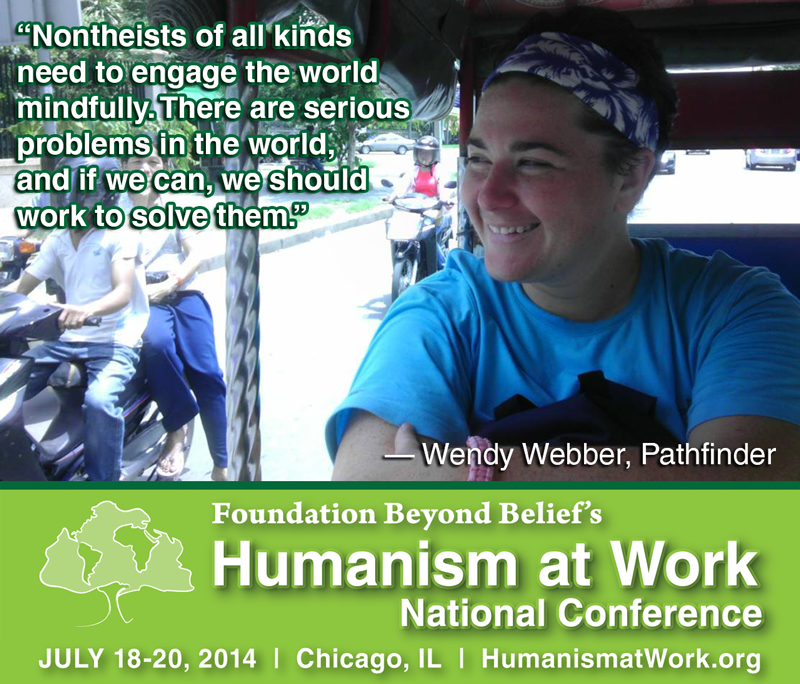
Embracing the adventure: Wendy Webber, Pathfinders Project
By AdministratorWendy Webber took some time out of her sustainable development work in Minca, Colombia, to reflect on her year of humanist service currently underway with Pathfinders Project.
Growing up in Las Cruces, New Mexico, Wendy Webber was surrounded by religion. “My extended family includes everything from a former Catholic priest to an evangelical atheist to Orthodox Jews to evangelical Christians. There were years that I went to a Passover Seder on Saturday night and was hunting for Easter eggs the next morning. But for all that, religion was mostly absent from my life.” She realized early on that she was an atheist, but never connected with the freethought movement.
Wendy had engaged in service for years, though nothing on her current level. “Aside from the occasional day of service and donating blood regularly—‘religiously,’ you might say—my only real engagement with service was volunteering a couple of times a week at Integrated Refugee & Immigrant Services (IRIS) in New Haven, Connecticut. It’s an agency that helps newly arrived refugees secure housing, visas, and jobs. I worked with the Health and Wellness Coordinator to help refugees navigate the U.S. healthcare system, which is daunting even when you speak English.”
It was through an announcement by Harvard Humanists that she first learned about Pathfinders Project. She signed up quickly, was selected for the inaugural team, and in just a few months found herself on a plane to Cambodia. “We were in Cambodia as humanists partnering with the Buddhist monks to teach English to local underprivileged children who were Buddhist, Christian, and Muslim. We were working together on a problem not because we shared the same beliefs or tradition but because it was a common problem that we could both contribute to the solution. Meeting the chief of the pagoda where we were working and having him tell us in very halting English how happy he was to have our help confirmed for me that we were doing the right thing.”
Her time at Kasese Humanist Primary School in Uganda—a nation Wendy describes as “coercively religious”— offered a different set of challenges. “To graduate from one grade to the next requires answering questions on an exam like, ‘Who is your personal savior?’—a question that I can assure you has an assumed correct answer.” The Pathfinders taught several subjects, including religion. “The struggle for me was how to teach religion without seeming to proselytize for any tradition, including humanism,” Wendy recalls. “I decided to make the class a comparative religion class. Some of my favorite moments were introducing my students to the concept of polytheism, something most had never heard of. I had wonderful conversations with the older students, such as whether the Baha’i concept of one universal government is a good idea.”
As she enters the final months of the trip, I asked how the experience has changed her. “Well, I’ve learned how to hand wash my clothes, and I can tolerate cold showers better,” she jokes. “But seriously, I have a greater appreciation for the steep obstacles social justice work faces. I have a much greater understanding for the struggles that nonreligious people face around the world and in the U.S. But I also have greater hope in humanity’s ability to come together beyond our differences to make the world a better place for all.”
Pathfinders has given Wendy an opportunity to reflect on the intersection of humanism and service. “Nontheists of all kinds need to engage the world mindfully,” she said. “There are serious problems in the world, and if we can, we should work to solve them. Service is a worthwhile and necessary end in and of itself. But the opportunity to engage in interbelief collaboration through service is what made me the most excited about Pathfinders.”
For those who will follow her in the Humanist Action: Ghana, Wendy has this advice: “Go ready for an adventure—any adventure. Whatever happens will be an adventure. If you leave with this mindset, it is impossible to have a bad time. Talk with everyone you meet. Some of my best interactions have been with shopkeepers and cab drivers. Try not to have expectations about the country or the people, or about what you will get out of the experience. Without expectations, you can’t be disappointed in what you encounter, only surprised and excited.”
Wendy and the other humanist volunteers of Pathfinders Project will talk about their experience at FBB’s Humanism at Work conference in Chicago, July 18-20. Learn more and register at www.HumanismAtWork.org.
